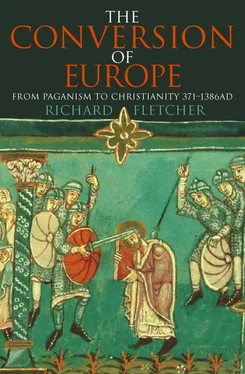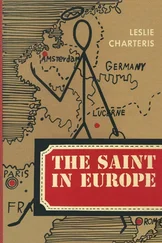1 ...8 9 10 12 13 14 ...40 Another who was brought to that brink was Augustine’s younger contemporary Prosper of Aquitaine. Usually remembered mainly as the writer of a chronicle which is an important source for fifth-century history – we shall meet it in Chapter 3 – Prosper was also the author of works of theological controversy. One of these was called De Vocatione Omnium Gentium ( On the Calling of All Nations ) and it was composed at Rome in about 440. Prosper’s De Vocatione has been called ‘the first work in Christian literature to be concerned with the salvation of infidels’. 11 Salvation, yes; but not quite their evangelization.
Prosper starts from the proposition that God wishes all men to be saved. However, by His inscrutable judgement some peoples receive the faith later than others. He considers, but rejects, the Eusebian position: ‘Christian grace was not content to have the same frontiers as Rome and has already subjected many peoples to the sceptre of Christ’s cross whom Rome did not conquer with arms.’ 12 Christian grace: this lay at the doctrinal heart of Prosper’s concerns. He was an extreme follower of Augustine’s teachings on grace. These had been developed in opposition to the doctrines on free will taught in Italy and subsequently Palestine by the British-born philosopher Pelagius, doctrines which caused a great stir in the church and were eventually declared heretical in 418. Prosper’s general position was that it was for divine grace alone to bring about conversion. One suspects that he would have sympathized with the Baptist ministers who rebuked William Carey in 1786. Like Augustine, Prosper hesitated. If grace is omnipotent, irresistible, omnipresent and inscrutable, then might it not be that for humans to choose to undertake missionary preaching was presumptuously to interfere with its workings? Prosper never asserted this in so many words, but one can sense the thought lurking there unformulated.
Perhaps, in the last resort, western theologians like Augustine and Prosper could never quite forget that they were Romans. They might have had their doubts – indeed, we know that they did have their doubts – about the moral tradition which had corralled Christianity safely inside the city walls of the empire; but it was hard to break with the cultural habits of a millennium. It takes an outsider to think the unthinkable. However, what had still been unthinkable in the age of Augustine and Prosper had become absolutely thinkable by the time that Paulinus encountered Edwin two centuries later. What had happened in between to bring this about?
CHAPTER TWO
The Challenge of the Countryside
‘It is my belief, Watson, founded upon my experience, that the lowest and vilest alleys of London do not present a more dreadful record of sin than does the smiling and beautiful countryside.’
SIR ARTHUR CONAN DOYLE, ‘The Copper Beeches’,
The Adventures of Sherlock Holmes , 1892
AT ONE POINT in the course of Origen’s celebrated work Contra Celsum , in the context of claims for the extent of Christian evangelization, the author boasted that Christians ‘have done the work of going round not only the cities but even villages and country cottages to make others also pious towards God’. This was certainly an exaggeration. In Origen’s day Christianity was still a preponderantly urban faith. What is interesting, however, is that the claim should have been made at all, that it should have seemed to the writer an apposite claim to make in the course of polemic. It is even more interesting that the earliest name associated with the conduct of rural mission within the Roman empire should have been a pupil of Origen. This was Gregory of Pontus, familiarly known as Gregory Thaumaturgus, Gregory ‘the Wonder-worker’.
The bare facts of Gregory’s career may be summarized as follows. He was born in about 210 into a prominent family of the province of Pontus Polemoniacus, roughly speaking the northern parts of central Asia Minor, modern Turkey, bordering on the Black Sea. Pontus was a quiet, undistinguished region. It was off the beaten track, a province whose towns were small, whose concerns were local and agricultural. It was modestly prosperous in the way that places are where nothing much happens to disturb the even tenor of life. Gregory belonged by birth to one of those provincial elites on whose local services and loyalties the empire depended for its smooth functioning. As a young man he was sent off to study at the famous law schools of Berytus (Beirut): a distinguished career in law or rhetoric or the civil service seemed to be in prospect. But his life took a different and unexpected turn. Gregory met Origen, who was then at the height of his fame as a teacher and scholar and who had attracted a talented band of pupils round him at Caesarea in Palestine. Gregory stayed with Origen for five years and then returned to Pontus; this would have been, as we may suppose, round about the year 240. On his return home he became bishop of the Christian community in his home town of Neocaesarea, the capital of the province, which office he exercised for the remainder of his life. He and his congregations survived the persecutions of the reign of the Emperor Decius (249–51) and weathered the disruptions of barbarian raids in the mid-250s. Under Gregory’s leadership the Christian community of Pontus grew, though at what rate or by how much we cannot tell. 1 He died in about 270.
These bare facts are just about all that we know. Gregory has left us a body of writings which tell us something about him. His farewell address of thanks to his master Origen has survived, from which we can learn something of both his intellectual development and a great teacher’s methods. A paraphrase of the book of Ecclesiastes bears witness to his biblical studies. A document known as the Canonical Letter sheds a little light on his pastoral activities as bishop. In addition to Gregory’s own writings we have a short oration or sermon in commemoration of him composed about a century after his death by his namesake Gregory of Nyssa. It has often been remarked that the oration contains little if any reliable information about the historical Gregory of Pontus. It is a collection of hagiographical commonplaces. Indeed: but the judgement needs two qualifications. First, traditions of Gregory had been handed down by word of mouth. Gregory of Nyssa’s own older brother, Basil of Cappadocia, had as a small boy learned wise sayings attributed to Gregory of Pontus at the knees of his grandmother Macrina. Oral traditions may be garbled, adapted, misunderstood, misapplied, but they will generally preserve something of the person who uttered them or to whom they refer. Second, the Christianization of Pontus was still incomplete when Gregory of Nyssa was writing. The stories he reports show what his late-fourth-century audience was ready to believe about the earlier Gregory, about the process he initiated which was still visibly and audibly going on round about them. The stories had to be plausible not just in terms of their expectations of a wonder-worker but also in terms of their expectations of everyday life: and it is not for us to be surprised if these categories of expectation prove to overlap. Carefully handled, the legends of Gregory Thaumaturgus may have something to tell us – just something – about what he set in motion in Pontus.
Gregory of Nyssa claimed that when Gregory became bishop of Neocaesarea there were only seventeen Christians in the diocese but that by the time of his death there were only seventeen pagans. This is demonstrably an exaggeration. It can be shown that pagan observance was lively in Pontus both before and after Gregory’s day. It has even been said that it is ‘misguided and anachronistic’ to cast Gregory for the role of rural missionary. 2 Our reaction to such a judgement will depend a little on the images and expectations prompted by the phrase ‘rural missionary’. Pontus was a backwoods sort of place. Gregory felt affection for his native province, but even he must have been ready to concede that after the sophisticated urban culture of Beirut and Caesarea, in returning to Pontus he was retreating to a country backwater. (The Christian idealist who exchanged a promising ‘metropolitan’ secular career for a provincial ecclesiastical one is a recurrent figure of the late Roman period: Gregory is an early, Augustine the best-known example.) Because Pontus was the sort of place that it was, because urban and rural society overlapped and interpenetrated there, a bishop who made his presence and his power felt would be making an impression upon his rural as well as upon his urban constituency. It is in this sense that we may call Gregory a rural missionary.
Читать дальше












